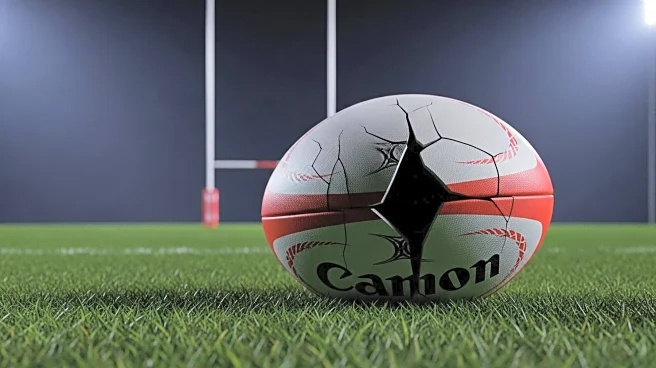What's Happening?
Imogen Mitchell-Webb, associate partner and head of sports at Horwich Farrelly, has highlighted the challenges faced by female rugby players regarding concussion claims. Female players often experience longer recovery times from concussions compared to their male counterparts, leading to higher insurance claim payouts and increased time loss costs. The data suggests that while male players typically suffer concussions from direct impacts, female players are more likely to experience them through whiplash-type injuries. This difference in injury mechanism has implications for insurance coverage and the structured return-to-play process, which takes longer for women to complete. The disparity in salaries between male and female rugby players further complicates the ability of female athletes to afford comprehensive insurance coverage.
Why It's Important?
The issue of concussion claims in female rugby players is significant as it underscores the broader challenges of gender disparity in sports insurance and player welfare. Female rugby players face higher risks and longer recovery periods, which can affect their career longevity and financial stability. The salary gap between male and female players means that women are less able to afford the necessary insurance coverage to protect against career-ending injuries. This situation highlights the need for tailored insurance solutions and potentially different regulatory measures to address the unique risks faced by female athletes. The ongoing discussion around concussion claims could lead to changes in sports regulations and insurance policies, aiming to better protect female players.
What's Next?
There are potential steps that could be taken to mitigate the risks associated with concussions in female rugby players. Sporting bodies may consider introducing different rules for women and men based on emerging data about injury risks. Changes in tackle heights and scrum rules have already shown promise in reducing head-to-head impacts, which are common causes of concussions. Additionally, there may be a push for more equitable insurance solutions that account for the financial constraints faced by female athletes. These developments could lead to improved player safety and more balanced insurance coverage across genders.
Beyond the Headlines
The discussion around concussion claims in female rugby players also touches on broader issues of gender equality in sports. The financial disparity between male and female athletes reflects wider societal challenges in achieving equal pay and opportunities. Addressing these issues requires a multifaceted approach, including changes in sports governance, insurance industry practices, and cultural attitudes towards female athletes. The focus on concussion claims could serve as a catalyst for broader reforms in sports insurance and player welfare, promoting a more inclusive and equitable environment for all athletes.









